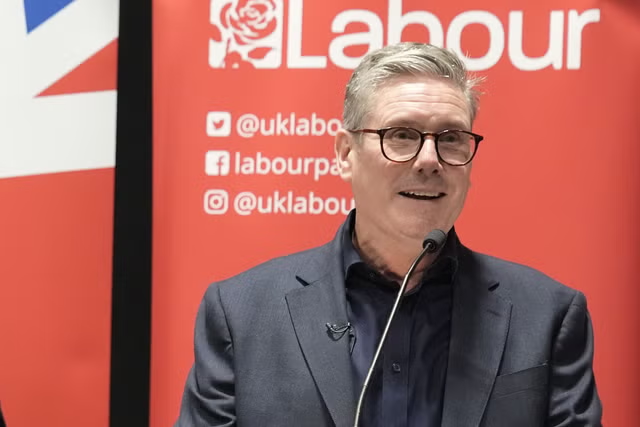Your support helps us to tell the story
Support NowMy recent work focusing on Latino voters in Arizona has shown me how crucial independent journalism is in giving voice to underrepresented communities.
Your support is what allows us to tell these stories, bringing attention to the issues that are often overlooked. Without your contributions, these voices might not be heard.
Every dollar you give helps us continue to shine a light on these critical issues in the run up to the election and beyond

Eric Garcia
Washington Bureau Chief
Nobody had high expectations of this Labour government. That could have been one of its strengths: that people would accept it had taken over at a time when the public finances were in a bad way, and so any small improvement would be a welcome relief, earning generous approval from the voters.
But I am afraid Keir Starmer has blown it. He has taken people’s low expectations and said, in effect, that they were not low enough. It has become an established view – already – that the government has made a bad start, which means that a lot of the coverage of Labour’s annual conference in Liverpool, starting this weekend, will be organised around the question: can he turn things around?
That such a question is being asked at this early stage is almost a guarantee that the answer is “No”.
Starmer should have paid more attention to the advice of Labour’s longest-serving prime minister. Tony Blair won’t be attending the party conference, but he has just published a book, On Leadership. Its first sentence reads: “Every government, if it wants to be successful, if it wants to navigate the treacherous political landscape which will be its habitat, needs a plan.”
Starmer had a plan to win the election, but he had no plan for government. He has “missions”, including the highest sustained growth in the G7 and an NHS fit for the future, but they are not a plan. As Blair writes: “A ‘plan’ is not the same as a collection of desirable objectives or highfalutin visions.” He quotes Helmut Schmidt, former chancellor of West Germany, who said that politicians with “visions” should go and see a doctor. Perhaps politicians with “missions” should go and see a priest.
The most telling words spoken in the past week were those of an adviser quoted by the BBC who was critical of Sue Gray, the prime minister’s chief of staff who was responsible for preparations for government: “If you ever see any evidence of our preparations for government, please let me know.”
Starmer’s only plan for government was a plan for propaganda. His plan was to blame everything bad on the Conservatives and to assume that competence would make things better eventually.
But competence is not a plan. The biggest misunderstanding of Blair is the assumption that he was “just a good communicator”. He was also a theorist of good government, which is what his new book is about – the importance of prioritisation, target-setting and incentives. He was often a good communicator because he had something good to communicate. He would think hard about policy problems and appoint the right people to fix them.
Admittedly, the policy work before 1997 was limited. It consisted of a plan to raise literacy and numeracy standards in primary schools and to give the Bank of England control of interest rates. But those were important changes, and it might be expected that this Labour government would have learned from that experience and have done more preparation for power, not less.
Instead, Starmer has drafted in Michael Barber and Alan Milburn as advisers, after the election rather than before. Barber was author of that primary schools plan and later head of Blair’s delivery unit, while Milburn was health secretary responsible for making the NHS the best it has ever been by the end of the last Labour government – and yet they are only now being asked to help turn things round after this government’s rocky start.
Morgan McSweeney, Starmer’s head of political strategy, apparently briefed the cabinet on Tuesday with a “list of the government’s achievements to date”, but they were mostly legislation to do things after “consultation” or to set up institutions such as GB Energy that have no clear purpose. He also listed the end to doctors’ strikes, which is welcome but the absolute minimum that should be expected of a new government.
While failing to prepare for government, Starmer also seems to have been ignoring problems that were bound to cause him trouble. He cannot blame the fuss over freebies on poor communications, because the facts themselves are unavoidably embarrassing. He accepted gifts for his personal benefit, and he and his colleagues have not been entirely open about it.
This matters not just because it was wrong, but because competence, stability and integrity were three improvements that his government could have delivered in its early days at no cost to the taxpayer.
He has blown that chance. And it also matters because it disrupts the communications plan. That plan was to go to conference and to hammer home the argument that he and Rachel Reeves had inherited a wasteland from the Tories – and to start to emphasise the good things that would come in time.
But the second part of that message is not going to be believed, if it is going to be heard at all. The New Labour government in 1997 faced a yawning gap between expectations and delivery for its first two years, but it maintained the goodwill of the voters and it had detailed and credible plans for the delivery of better public services. This government has neither.
Disclaimer: The copyright of this article belongs to the original author. Reposting this article is solely for the purpose of information dissemination and does not constitute any investment advice. If there is any infringement, please contact us immediately. We will make corrections or deletions as necessary. Thank you.



